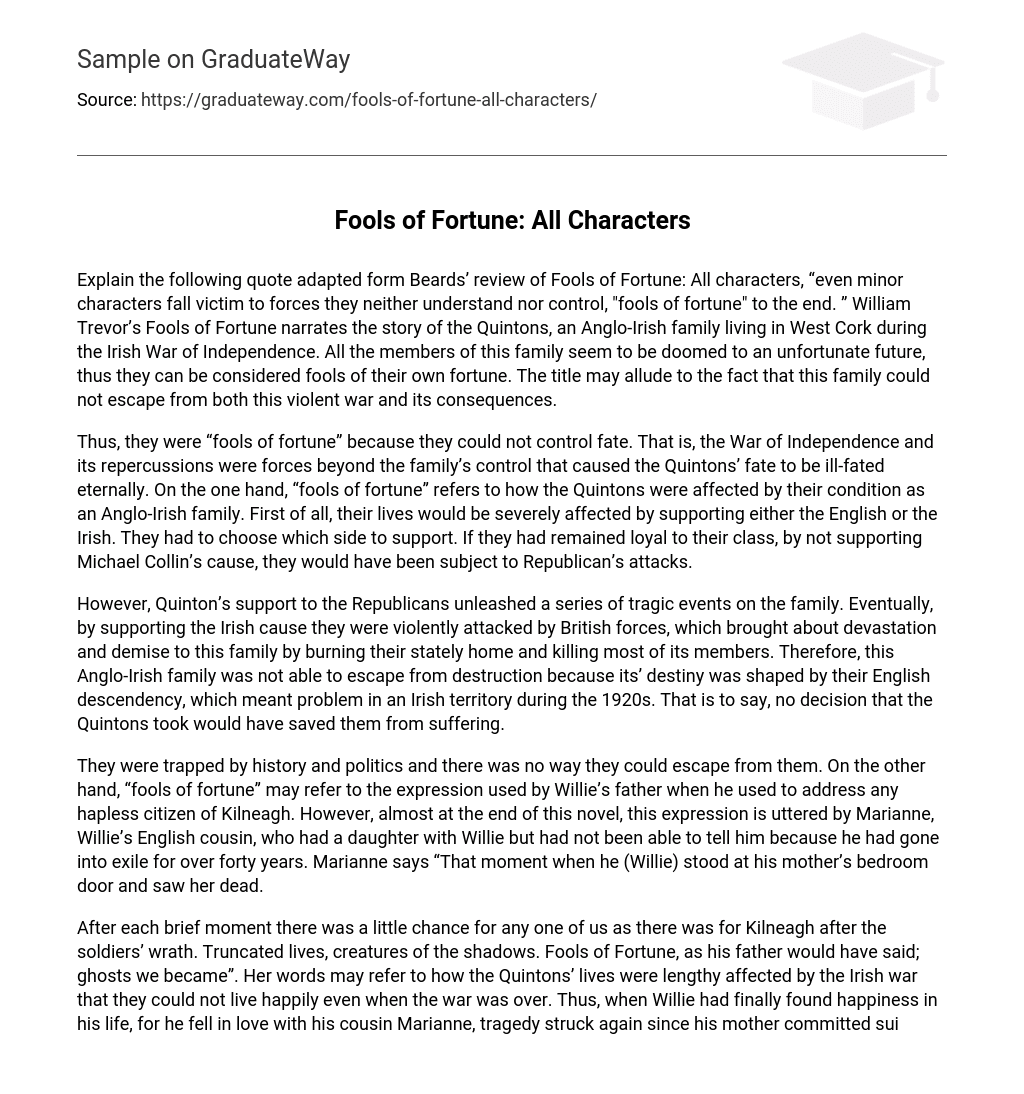In “Fools of Fortune” by William Trevor, all characters, including minor ones, are depicted as falling prey to unknown and uncontrollable forces. They are labeled as “fools of fortune” throughout the story. Set in West Cork during the Irish War of Independence, the novel follows the Quintons, an Anglo-Irish family whose destiny seems to be marked by misfortune. The title suggests that this family is unable to escape the devastating impact of the violent war and its aftermath.
Thus, the Quintons were considered “fools of fortune” due to their inability to manipulate their fate. In other words, the outcome of the War of Independence and its consequences were circumstances beyond the family’s control, leading to their perpetual misfortune. On one hand, being “fools of fortune” signifies how the Quintons were impacted by their Anglo-Irish background. Their lives were significantly influenced by their allegiance to either the English or the Irish. They were forced to take a side and if they chose not to support Michael Collins’ cause, as loyal members of their social class, they would have become targets for Republican attacks.
Supporting the Republicans had dire consequences for Quinton’s family. Backing the Irish cause resulted in a brutal attack by British forces, leading to the destruction and death of most family members and the burning of their grand home. Their English descent and presence in an Irish territory during the 1920s sealed their fate, making it impossible for any decision made by the Quintons to spare them from suffering.
Trapped by both history and politics, there was no possible way for them to escape. On the other hand, the term “fools of fortune” could be referring to the phrase Willie’s father would use when addressing any unlucky resident of Kilneagh. However, towards the end of the novel, Marianne, Willie’s English cousin, who bore him a daughter but was unable to inform him due to his forty-year exile, speaks this phrase. Marianne recalls the moment when Willie stood outside his mother’s bedroom door and discovered her lifeless body.
After each fleeting moment, none of us had a chance, just like Kilneagh after the soldiers’ wrath. Our lives were shortened, like shadowy creatures. As his father would say, we were foolish victims of fortune; we became ghosts.” These words may allude to the long-lasting impact of the Irish war on the Quintons’ lives, preventing them from finding happiness even in the absence of conflict. Thus, when Willie finally found love with his cousin Marianne, tragedy struck once more when his mother took her own life, years after her husband and two daughters were killed by British forces.
In the end, Willie seeks revenge for his family’s death by murdering Seargant Rudkin. Consequently, Willie flees and abandons Marianne and their daughter in exile. Marianne, on her part, laments never being able to reunite with Willie, and their daughter Imelda gradually descends into madness after learning about her father’s traumatic past. In essence, the term “fools of fortune” is mentioned in the novel by both Willie’s father and later by Marianne to describe the unfortunate residents of Kilneagh.
To summarize, the Quintons were an Anglo-Irish family living in Ireland during a war against the British, making them victims of a tragic destiny. Their lack of control over their fate earned them the label “fools of fortune.” The title signifies how ill-fated individuals are often referred to by the characters. It also highlights how the Quintons’ fortunes were tragically altered by the war, a force they had no power to defy.





